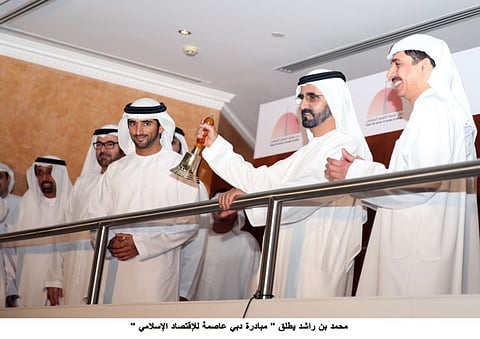Dubai launches sukuk initiative
Latest initiative to transform Emirate into a global centre for Islamic bonds

Dubai: On Wednesday, His Highness Shaikh Mohammad Bin Rashid Al Maktoum, Vice-President and Prime Minister of the UAE and Ruler of Dubai, rang the opening bell kicking off the next phase of Dubai’s Islamic economy initiative.
Eissa Kazim, chief executive of Dubai Financial Market and secretary-general of the committee governing Dubai’s Islamic economy initiative, said the goal of the initiative is to promote sharia-compliant activities, with one of those activities being sukuks.
“We will harmonise all standards, structures and regulations through having a unified sharia board at a government level to oversee the industry,” he told reports.
When Shaikh Mohammad originally announced the plan to develop Dubai into a centre for Islamic finance in January, it was to include Islamic finance instruments, Islamic insurance, Islamic contract arbitration, Islamic food industry and trade standards (Halal food), as well as Islamic quality-management standards.
According to Afaq Khan, Chief Executive Officer of Standard Chartered, Dubai is already an established financial hub both for the Middle East and internationally.
“The initiative announced by His Highness Sheikh Mohammad Bin Rashid Al Maktoum will provide further impetus for Dubai to raise its prominence as a centre of Islamic Finance,” he said in an emailed statement. “The need for improved infrastructure in Africa and the Arab Spring countries will create greater demand for capital raising in the future, including through use of the sukuk. Dubai is in a strong position to capitalise on this demand as a global capital markets hub.”
According to Simon Williams, chief economist at HSBC in Dubai, the combination of an economy that is connected to religious identity with rapidly growing emerging markets — which are likely to drive the global economic engine for years to come — means the initiative will be open to a much larger pool of investors.
“It’s a broadening of the investor base,” he said.
Efforts to bring an Islamic economy together, especially where financial instruments are involved, will increase its long-term viability.
“The deeper and more unified it is, the more rapidly it is likely to grow,” he said.
According to Zawya Sukuk Monitor’s Quarterly Bulletin for the fourth quarter for 2012, the value of global sukuk issuances have growth from $34.4 billion in 2009 to $139.5 billion in 2012, with approximately $24.4 billion of those sukuk being issued in the Mena region. Malaysia saw the largest issuance of sukuks, with $21.9 billion worth of issuances in the quarter. Dubai ranked fifth with $1.16 bilion. However, Dubai ranked third globally in the first three quarters of 2012 with $5.3 billion worth of sukuk issuances in total.
Islamic finance refers to economic practices that comply with Sharia law, which generally prohibits interest, short selling and certain types of “uncertainty,” such as futures trading and conventions insurance.



